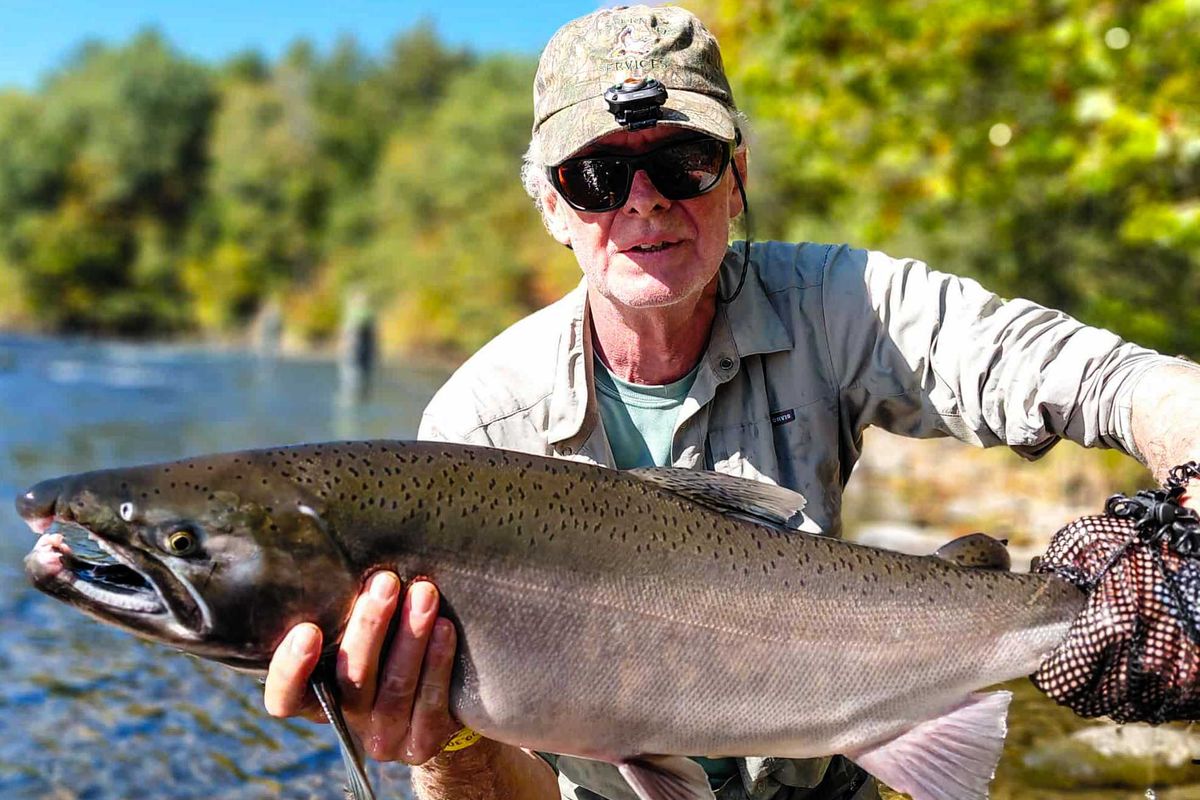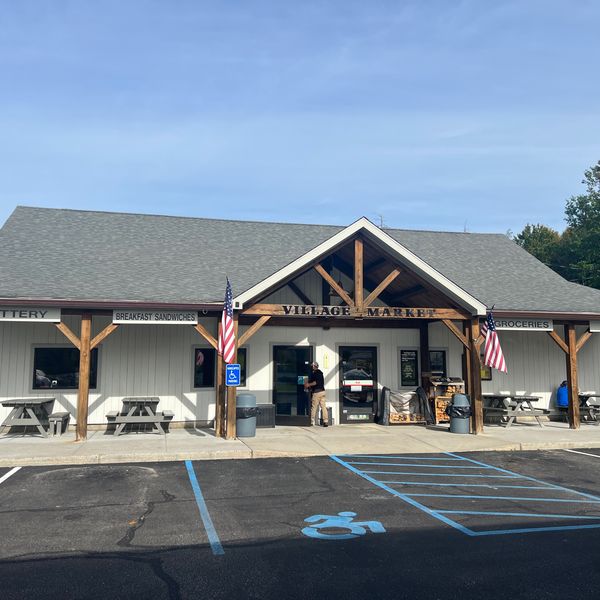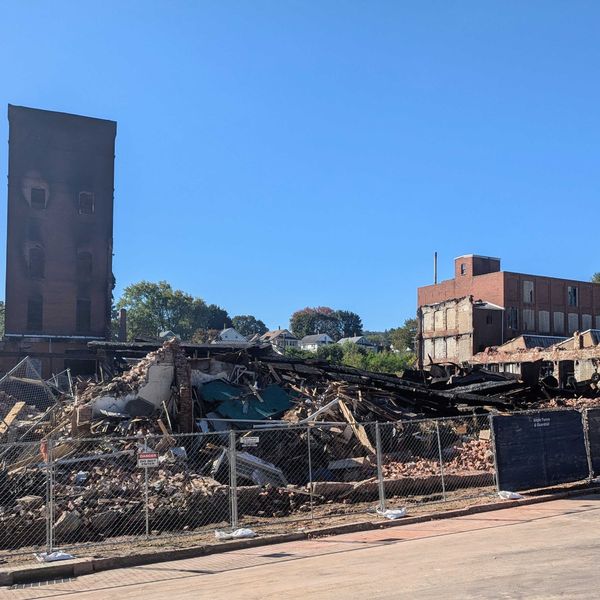Latest News
Robin Crofut-Brittingham in her studio.
Provided
Robin Crofut-Brittingham, a native of East Canaan, is an established artist living in Montreal. Her new book, “TheIlluminated Book of Birds” will be published Oct. 21 by Timber Press, and there is an accompanying art show at Berkshire Botanical Garden in Stockbridge, “Flock: Watercolor Paintings by Robin Crofut- Brittingham,” on view from Oct. 18 through Nov. 30.
The paintings in the book look as if they are from a 19th century book. In a phone interview with Crofut-Brittingham, the artist said the traditional look is intentional.
“I’m always combing over antique natural history books.”
In her travels around the world (including France and Russia), she has made a point of observing the local birds.
She describes herself as “an amateur naturalist.”
Now working as a full-time artist, and “selling enough to make it work,” it occurred to her that while regional bird guides are fine for their purpose, she could do something special with watercolor renditions of birds she has seen.
Hence the new book.

Crofut-Brittingham grew up in the East Canaan section of North Canaan, the daughter of artist Erica Crofut and the late Peter Brittingham.
There is a public opening reception on Friday, Oct. 24, from 4 to 6 p.m. at Berkshire Botanical Garden, and a special artist tour of the exhibition from 2 to 3 p.m on Saturday, Nov. 29.
Keep ReadingShow less
A room that felt breezy in July can seem stark in October. Adding layers — pillows, rugs, curtains — grounds a space.
Kerri-Lee Mayland
They are hard to miss — eye-popping mansions so large it takes a few seconds just to drive by as your eyes try to take it all in. Commanding? Absolutely. But the measure of a home’s success isn’t square footage. It’s the feeling a space creates.
I was reminded of that during a visit to a friend’s home in Ottawa last fall. He and his wife invited us over for what turned out to be one of the most memorable evenings of the season.
Their house sits on a tree-lined street not far from the downtown center — the kind of neighborhood perfect for trick-or-treating, where you could collect a good haul of candy in a short time. There’s no room for sprawling country estates here. These city homes balance history and charm while offering something even more meaningful: warmth.
Nelson is a self-taught pizza connoisseur. We arrived to his station of homemade dough and countless topping combinations he picked up earlier that day from a nearby Italian market. His setup included a large brick oven that glowed near a red-and-white checkered tablecloth, with soft Italian music playing. The table was set beneath string lights, and the night air carried that unmistakable mix of woodsmoke and autumn chill. Neighbors drifted by — one stopped after work for a slice — and before long, Nelson and Deanna’s little backyard felt like a scene from a storybook.
At one point, Nelson said, “You’ve seen my home…it’s not huge.” I cut him off immediately. “It doesn’t matter,” I said. “It’s how a home feels — and yours is off the charts with warmth!” That night crystallized a truth I carry into my work with clients here in Litchfield County, and specifically in Lakeville, where most homes are intentionally not McMansions. Instead, they are charming cottages and rambling older homes — smaller in size but bursting with character, history and heart.
I recently worked with a family in Canaan who wrestled with this very issue. Their home brimmed with treasures from abroad — textiles, pottery, artwork and sentimental mementos too precious to discard. Each piece told a story, but together they overwhelmed the eye. By editing and layering, we allowed their favorites to shine while storing others for later rotation. The result was a home that breathed. When they hosted friends, guests noticed not the size of the house, but the warmth of its atmosphere.
Creating that kind of feeling doesn’t require an interior designer — or a big budget, to be honest. It often comes down to intention. A well-placed lamp that softens the evening light. A textured throw across a sofa. A dining table, however small, always ready to fit one more chair. These touches whisper “welcome” in ways oversized square footage never can.
Fall is the perfect season to reassess. A room that felt breezy in July can seem stark in October. Adding layers — pillows, rugs, curtains — grounds a space. But restraint is just as important. Too many seasonal touches, and a home tips into clutter. Too few, and it feels unfinished. Somewhere in the middle lies the sweet spot, where comfort and style meet.
I often suggest what I call the “guest test.” Imagine a friend stopping by on a chilly evening. Would they feel comfortable settling in with a cup of tea or a glass of wine? If the answer is yes, you’ve likely found the balance.
Homes don’t need to impress physically. They need to express emotionally. Guests won’t remember if your bookshelf was perfectly styled, but they will remember how your home made them feel — cozy, cared for and welcome. That’s the magic.
My Ottawa friend’s city house proved it best. Under twinkling lights, with dough stretched by hand and endless laughter in the night air, it wasn’t about size at all. It was about warmth, generosity and connection — the true heart of every home. In Lakeville, that same spirit shines through smaller cottages and rambling homes, where charm, character and care create spaces people love to linger in.
Because in the end, a home isn’t measured in square feet, but in the memories it holds.
Kerri-Lee Mayland is an Emmy award-winning news anchor and designer. She lives in Lakeville.
Keep ReadingShow less
One of the Monuments to Motherhood sculptures by artist Molly Gochman at Prospect Park in Brooklyn, New York, located near the Grand Army Plaza entrance.
Photo courtesy of Molly Gochman / By Alex McTigue
The Wassaic Project will unveil two new large-scale installations by artist and activist Molly Gochman on Saturday, Oct. 18, from 4 to 6 p.m., including “Monuments to Motherhood” and “inseparable.” The free, family-friendly event is open to the public.
Gochman, a longtime supporter of the Wassaic Project, said she’s honored to see her works installed in a community “rooted in empathy, creativity and play.”
Her first installation, part of her Monuments to Motherhood series, is a nearly 10-foot bronze sculpture that celebrates the often unseen and undervalued labor of caregiving, challenging traditional ideas of what deserves public commemoration.
“I grew up surrounded by monuments to violence, like most of us, and began questioning what — and who — we choose to monumentalize in public,” said Gochman, reflecting on the many statues and monuments across the country that commemorate violence and war.
Gochman is also the founder of the Red Sand Project, a participatory artwork that uses sidewalk and earthwork installations to raise awareness and inspire action against human trafficking and exploitation. After years of exploring such complex issues, Monuments to Motherhood emerged from her desire to imagine prevention instead of reaction.
“I realized that care is the antidote to exploitation and decided to focus my next project on celebrating caregivers,” she said.
While many of Gochman’s works are created from inexpensive or discarded materials — such as construction debris used in a recent project symbolizing the Ukraine-Russia border — she said bronze was essential to this concept.
“Bronze will outlast me and my children,” she said. “It’s a material we’ve long valued, and it has this kind of magic alchemy with its environment. Every touch changes it — the oils from our skin leave marks that make it shine over time. Even the rain shapes it, marking it the way life leaves traces on us.”
Reminiscent of playgrounds, the architectural forms and loops of Gochman’s sculptures invite visitors to step inside and engage through touch. The art not only welcomes interaction, but also seems to hold and support those within it — like a protective womb.
Additional large-scale Monuments to Motherhood sculptures have been unveiled at other locations in the country, including Prospect Park in Brooklyn and Medical District Park in Memphis.
Accessibility and connection are central to Gochman’s work. Her second piece on the Wassaic grounds, “inseparable,” spells the word in Braille through 28 grass-covered earth mounds, inviting visitors to climb, play and engage physically. Gochman said it “symbolizes our deep interconnection with one another and the natural world.”
With this work, she pushes back against the human tendency to feel “fragmented” and separate from one another. “We’re all made of the same stuff — stardust — constantly recycled and connected,” she said. “There’s no real divide between us and the world around us. It’s all inseparable.”
With both works, Gochman hopes to uplift the ideas of care and community. Ultimately, she believes people themselves are “breathing monuments.” Through Monuments to Motherhood — and its unmistakably reflective bronze surface — she hopes visitors “find their reflection in it and see that they, themselves, are the monument.”
Community members and visitors are encouraged to come climb, play and reflect at the Wassaic Project next weekend. Gochman’s new works will remain as long-term installations on the grounds.
Keep ReadingShow less
Low water, bad hip, no fish
Oct 15, 2025
Gary Dodson managed this Coho salmon in the Salmon River in western New York two weeks ago despite low flows in that watershed.
Patrick L. Sullivan
This is the autumn of my discontent.
There are two problems disrupting my fall fishing. The first is the drought. I’m not sure it’s been officially declared but I have eyes. My main stomping grounds, the Housatonic and Esopus watersheds, are super low and have been for weeks. These main rivers are just barely fishable, and forget the tributaries.
This is disappointing because fall fishing is my favorite time. Trout put on the nosebag in anticipation of the long, bleak winter, and the chiller temps chase off the more casual anglers.
Not that I’d be able to fish much right now, which brings me to the second problem. Fate has given my right hip the gang gong.In early September I could hardly walk. With the aid of a steroid shot about a month ago, I slid back into the convalescent class and could do a bit of controlled hobbling, but surgery seems inevitable.
A few weeks back I took a week off in the Catskills and on day one limped out into the Esopus, where I played with the switch rod rig my main Catskill fishing buddy Gary Dodson assembled for me and managed one small rainbow before declaring victory and making my painful and awkward way out. I spent the rest of the week chopping firewood, which doesn’t involve the hip much, and watching bad cinema, which doesn’t involve the hip at all.
So I am in the unenviable position of getting my fishing kicks vicariously.
Gary has been out in Pulaski chasing salmon in similarly low flows. As per usual on the Salmon River, it’s hit or miss. Lately more hitting than missing, and he keeps me updated with photos and cryptic text messages such as “Had a good one come unbuttoned last second. Nick said it was at least 25 pounds.” Nick is Gary’s favorite guide, because he is a fearless wader and gets Gary’s salmon in the net.
He also went all the way down to where the Esopus empties into the Ashokan Reservoir with the idea of throwing streamers for big browns. He got smallmouth instead.

Still, it’s better than a poke in the eye with a sharp stick.
On the other hand, what would be worse than a poke in the eye with a sharp stick? Leprosy?
Meanwhile, the Connecticut Department of Energy and Environmental Protection stocked the two Trout Management Areas of the Housatonic recently, and with the flow low but water temperatures acceptable this is the time to get out there and practice stuff with willing participants.
I would be doing two things.
The first is playing around with dry-dropper rigs. This is when you attach a nymph on a dropper tied to the bend of the hook of a very visible dry fly. It is very similar to indicator nymphing except the fish might hit the dry fly instead of the nymph. It also appeals to my inner traditionalist in a way a bright orange bobber most decidedly does not.
I usually go with short droppers, no more than two feet, but I got to thinking about maybe adding a foot or two more and using an unweighted nymph or a wet fly. The idea is the extra length would allow the thing to sink a bit more and wiggle around in a way that suggests it is not in fact tied to that bug bushy thing that just floated by.
Suggestions: Stimulator for the dry, and a leadwing coachman wet fly on the dropper, thus imitating the stone fly and isonychia. Or the almost unsinkable Chubby Chernobyl for the dry, and an unweighted Prince or Zug Bug trailing behind. In deeper runs, assuming you can find any, I might go with a beadhead nymph, but probably not a tungsten head or Perdigon, as I think they’d just get hung up.
The other thing I want to try is using the switch rod rig and a slow-sinking leader to chuck out teams of three wet flies, swinging them downstream. The 11 foot rod and the elaborate combination of running line, shooting head and long leader (15-18 feet once it’s all assembled) requires at a minimum a well-controlled roll cast, a high stick, and a lot of mending.
But it also allows the angler to cover a lot of water without moving around much, which suits my present state. And it would allow me to work on my roll cast, not the strongest part of my game.
As I peck this out on Sunday, Oct. 5, I’ve had three straight days of walking almost normally, indicating the steroid shot has finally kicked in. So if you see someone on one of the more easily-accessed sections of the Housatonic making bad roll casts and cussing profusely, pull over and say hello.
Keep ReadingShow less
loading








